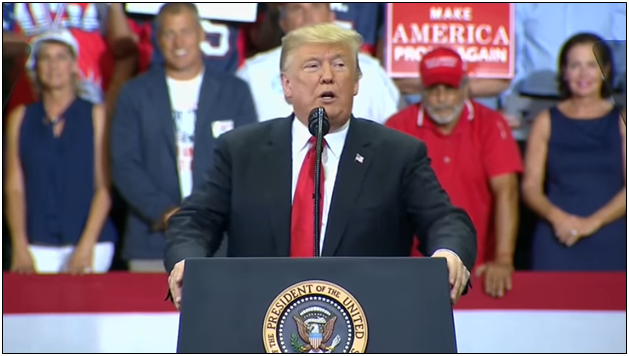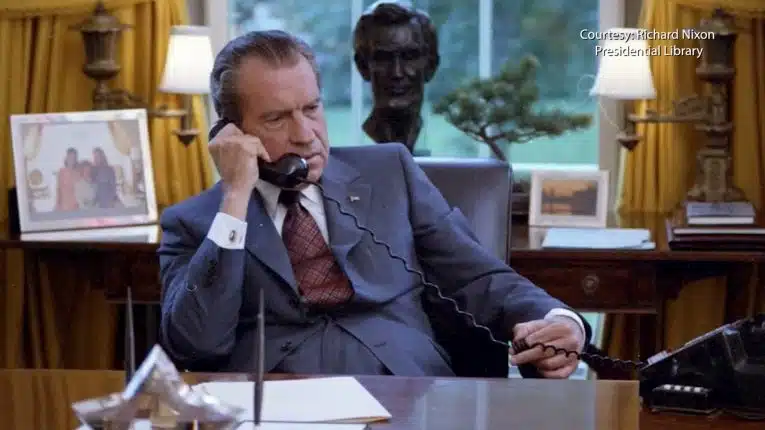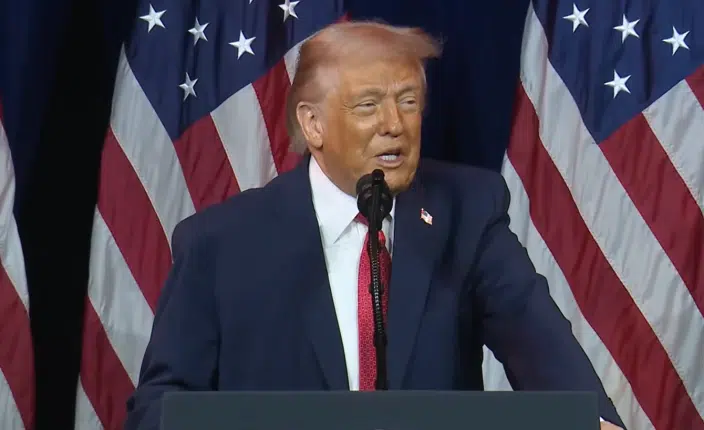By Natalia Castro
President Trump is leaving no stone unturned in the battle for Congressional control. The President is spending the last days leading up to the midterms visiting key battleground states in an attempt to persuade voters to come to the polls and vote Republican. As he rallies voter enthusiasm, he could push the closest races over the finishing line.
Between Thursday, Nov. 1 and Election Day on Tuesday, Nov. 6, Trump will visit Missouri, West Virginia, Indiana, Montana, Florida, Georgia, Tennessee, and Ohio, with double appearances in Missouri and Indiana.
These are all critical states for Republicans hoping to maintain control of the House and the Senate in the 116th Congress.
Real Clear Politics, a group which aggregates non-partisan polling data, identifies Florida, Indiana, Missouri, and Montana as “toss up” states for control of the Senate. West Virginia is considered a left leaning toss up and Tennessee a right leaning toss up. If all of these states went red, Republicans could garner at least 58 seats in the Senate — an historic achievement.
If anyone is interested in making history, it is President Trump.
A Harris Poll conducted by Harvard University last month found that 46 percent of registered Republicans associate with Trump, while 25 percent associate with the GOP itself. The Republican Party is now the party of Donald Trump, and his advocacy is necessary for pushing candidates to victories.
Senior Policy Director with America First Policies, Curtis Ellis told ALG President Rick Manning in an interview, “[President Trump] is doing what he did in the final days of the 2016 election cycle. He is flying nonstop, racking up frequent flyer miles, visiting every battle ground possible and mobilizing voters… It is the Trump voters that will be decisive in this election in the next few days… Trump understands that and that is why he is going out and hitting the voters that need to be hit.”
By visiting these critical states just days before the election, President Trump is reminding voters that voting Republican is voting for the America First agenda.
It might be working, too. NBC News now reports that Republicans hold a 2-point lead in early voting nationwide, 43 percent to 41 percent against Democrats, in what can only be described as potentially ominous sign for Democrats, who had been banking on a Blue Wave on Nov. 6.
In Florida, Republican Senate candidate Rick Scott appears to be trailing Democrat Bill Nelson by a mere two points. And Republican Governor candidate Ron DeSantis is trailing Democrat Andrew Gillum by three. Voter turnout on Election Day itself could determine the election.
Particularly in the panhandle, a right leaning area where Hurricane Matthew continues to displace residents and possibly prevent them from voting. To energize voters to still make it out to the polls, the President will be visiting Pensacola this weekend.
Indiana, a state which Trump won by 20 points in 2016, now leans toward Democrat Tim Donnelly by less than a point. Trump also won Missouri by over 20 points, but Democrat Josh Hawley leads Republican Claire McCaskill by two points. But President Trump’s decision to visit these states twice just days before voters head to the polls can energize the base enough to propel a Republican victory.
While Georgia does not have a key Senate race in the midterms, the Governor’s race has caught national attention and pulled in the President to visit. President Trump won the state by a slimmer margin than other victories, and Republican Gubernatorial candidate Brian Kemp only leads the polls by just over 1 point — making it one of the tightest races.
This race has also become a symbol of ideological division as Kemp — an NRA and Trump endorsed candidate battles against Stacey Abrams — who has been endorsed by Bernie Sanders, former President Barack Obama, and Hillary Clinton.
These races are simply too close to ignore and while previously candidates have cooled off campaigning in the days leading up to the election, President Trump has only ramped up his efforts, laying it all on the line. President Trump attracted many new members to the Republican Party in 2016 and it is clear he must continue to sway people to the right in order for a “red wave” to take place.
Over the next few days, Trump’s rallies will liven the Republican base and continue to give them a reason to vote on November 6.
Natalia Castro is the multimedia director at Americans for Limited Government.







